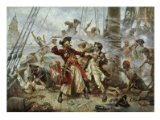More Pirate Pages
Pirate Fun
Pirates of the Carolinas: North Carolina Pirates, South Carolina Pirates

The Pirates of the Carolinas are strongly linked to Bath Town to the north and Charles Town to the south. Miles apart on the map and even farther apart in their relationship with the Brethren of the Coast, they tell a contrasting story of love and hate, profit and loss, peace and war.
In this article: Charleston / Bath
Pirates in America
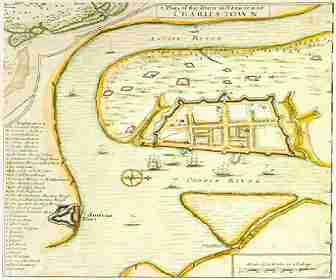
Charles Town (Charleston), South Carolina-
Founded on the banks of the Ashley and Cooper rivers in the 1600's, Charles Town was a major port city in a state that only rarely had a governor who welcomed pirates or their trade, although it was known that men of that sort mingled with the locals during or after their career.
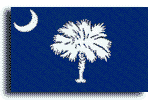 Buy
Flag (more info)
Buy
Flag (more info)
Charles Town leaders and residents grew increasingly intolerant of the raiding and plundering of men like William Lewis. The embarrassing blockade of the port which Blackbeard performed in May of 1718 and the terrorizing of Charles Vane a while later were so infuriating that Governor Robert Johnson dispatched Colonel William Rhett in the ships Henry and the Sea Nymph to deal with the criminals once and for all.
Rhett had a close brush with Vane, and eventually caught up with Stede
Bonnet in the Cape Fear River in September of 1718. Bonnet was
hanged in Charleston in November of that year with 30 of his crew.
Today, Charleston is arguably the capital of southern colonial history, and those visitors eager to take it all in can have a walking tour and get their fill of pirate lore.
Charleston Pirate Tours / Queen Anne's Revenge RestaurantBath Town (Bath), North Carolina-
The first town in North Carolina was founded in 1705 on the Pamlico
River fifty miles from the Atlantic. As the site of the first port
of entry and shipyard in the state, 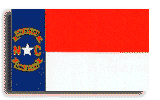 Buy
Flag (more info) it was symbolic of the welcome sign hung
out for pirates from the Ocracoke on the Outer Banks and Pamlico Sound
to the Cape Fear River near Wilmington. The shallow coastline which
hindered imports from merchant ships also lent itself well to the imports
and refuge of the shallow-draft pirate vessels.
Buy
Flag (more info) it was symbolic of the welcome sign hung
out for pirates from the Ocracoke on the Outer Banks and Pamlico Sound
to the Cape Fear River near Wilmington. The shallow coastline which
hindered imports from merchant ships also lent itself well to the imports
and refuge of the shallow-draft pirate vessels.
In Bath Town's succession of state governors, the one most predisposed toward pirates was Charles Eden, who often offered pirates like Stede Bonnet and Blackbeard pardons and also accepted bribes along with other officials in exchange for the pilferred goods deposited in the local market.
Blackbeard preferred North Carolina and Bath Town in particular as
his home during his last year of 1718. His wild pirate parties 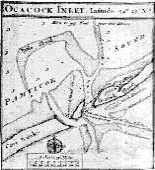 at
Ocracoke with fellow brethren like Charles Vane and his unrefined living
among the residents were among the things that wore their patience
thin in time, yet it took an intolerant Governor Spotswood of neighboring
Virginia to bring decisive action against this living legend.
at
Ocracoke with fellow brethren like Charles Vane and his unrefined living
among the residents were among the things that wore their patience
thin in time, yet it took an intolerant Governor Spotswood of neighboring
Virginia to bring decisive action against this living legend.
Lieutenant Robert Maynard was sent with two sloops, arriving at Ocracoke
on November 21, 1718, and the next day marked the end of the most famous
of all pirates. After a ferocious battle, Blackbeard was killed and
beheaded, then Maynard took the captured crew along with those rounded
up in Bath Town back to Williamsburg. Thirteen of the crew were tried
and hung in March 1719.
More about
Blackbeard
Bath Town's hopes of being the capital faded as towns with more advantageous locations developed. Today it is a small village with a large claim to the title of The Home of Blackbeard, probably the most widely recognized pirate in the world.
Bath Today / Ocracoke Island / The Outer Banks